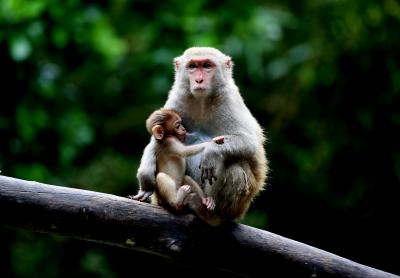New York, Aug 12 : US scientists have discovered antibodies in monkeys that could assist in the creation of next-generation vaccines that can provide additional protection against emerging variants of SARS-CoV-2 as well as other viruses related to SARS.The team from the Scripps Research Institute in California identified the antibodies, which come from macaque monkeys that are effective against various SARS-CoV-2 variations, and other SARS viruses such as SARS-CoV-1 the deadly virus that led to an outbreak in 2003.
They discovered that neutralising antibodies recognize the viral spike region that is more conserved in that it’s present across several SARS viruses and therefore less likely to undergo mutation over time.
The findings, which were published in Science Translational Medicine, revealed that specific animals are more capable of producing these kinds of “pan-SARS virus” antibodies than humans, which gives scientists clues about how to develop better vaccines.
“If we can create vaccines that trigger the same broad reactions that we’ve observed in this study, then these therapies may provide greater protection from the virus as well as variations of significance,” said senior author Raiees Andrabi, an investigator in the Department of Immunology and Microbiology.
In the study the monkeys were immunized with the spike protein of SARS-CoV-2 — the outer portion of the virus, which allows it infect and penetrate the host cells.
Two shots were given, which resembles similar strategies used with the current mRNA vaccines available in humans.However, unlike these vaccines macaques were found to have a wide neutralizing immune response to the virus, which includes variants like Omicron.
Analyzing the structure of antibodies they found that the antibodies recognize a region that is conserved near the edges of the area that the spike protein binds host cells, known as the angiotensin-converting enzyme 2 (ACE2) receptor binding site.This is distinct from the area that most of human antibodies are targeted, and is overlapping more with the receptor binding site of ACE2 and is more prone to change.
“The antibody structures show an important region that is common to a variety of SARS-related viruses.This region has never been found to be specifically targeted by human antibodies.It also suggests other strategies that could be employed to entice our immune system to recognize this particular area of the virus.” explained Ian Wilson, DPhil, Professor at the Institute.
Furthermore, the team stated that it’s important to remember that the gene that codes for the broad neutralising antibodiesIGHV3-73 is not the identical in humans.The predominant immune system in humans is linked to the IGHV3-53 gene.
It produces a powerful but smaller neutralising antibody response.
However, scientists claim that this discovery will allow us to rationally develop and engineer vaccines or vaccine-adjuvant mixtures that provide more protection against SARS-CoV-2 as well as its many variants.
“According to our research that macaques have an antibody gene which provides greater protection from SARS viruses.This finding is a reminder that studying the effects of the vaccine in monkeys will only take us so far, but it also provides an entirely new target for our efforts to develop vaccines which we could be able to identify using innovative strategies for designing proteins,” added Dennis Burton co-author and chair of the Department of Immunology and Microbiology.
rvt/vd







